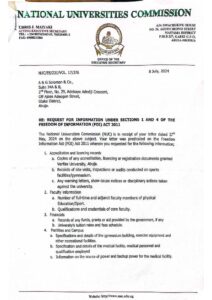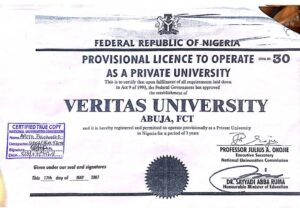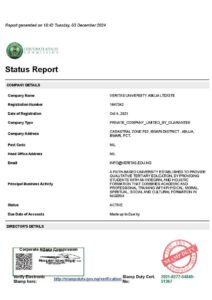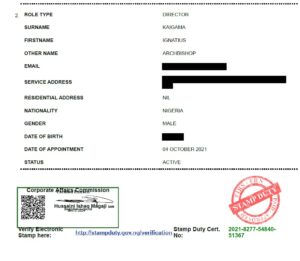EXPOSED: Documents: How Veritas University Operated For 14 Years Without A Valid Licence
The evening of April 30, 2024, began like any other at Veritas University’s campus in Bwari, a suburb of Nigeria’s capital. Joshua Èjuojo Daniel-Ejigbo, a 17-year-old student, headed to the university gymnasium for his usual workout. Hours later, he would be dead – a tragedy that has exposed a scandal reaching the highest levels of Nigeria’s educational system.
Documents obtained through Freedom of Information requests and reviewed by this newspaper reveal that Veritas University, one of Nigeria’s prestigious Catholic institutions, has been operating without a valid licence for nearly 14 years, putting at risk the degrees of thousands of students while raising troubling questions about regulatory oversight and corruption in Africa’s largest economy.
“My son went to the gym that evening trusting that he was in a proper institution,” said Honourable Daniel Oneal Ejigbo, Joshua’s father, his voice breaking during an interview. “We never imagined that not only was the gym unsupervised, but the entire university was operating illegally.”
According to a legal demand letter dated Monday, 20 May 2024 sent by the family’s lawyers to the university, Joshua lay unattended for 35-40 minutes after sustaining injuries in the unsupervised gymnasium. When help finally arrived, he was transported to the university’s clinic, which had no electricity. The compounded negligence proved fatal.
But as investigators dug deeper into the university’s operations, they uncovered something even more disturbing: the institution’s very existence appeared to violate Nigerian education regulation.
Internal documents from Nigerian Universities Commission, Nigeria’s university regulator reveal that multiple departments and senior officials would have had to ignore or bypass mandatory legal requirements when licensing Veritas University, pointing to what experts call “systematic and deliberate” regulatory failure.
According to the National Universities Commission’s (NUC) own guidelines, Requirement for the Establishment of a Private University (https://www.nuc.edu.ng/project/scopu/) obtained by this newspaper, applications for new universities must undergo intensive review by several professional departments, with legal documents specifically requiring scrutiny by the Legal Unit of the Executive Secretary’s office.
This NUC procedures require that before any university license is granted, the Legal Unit must review crucial documentation, including:
The University Law
Counterpart Deed of Assignment
Certificate of Incorporation/Registration
Deed of Assignment/Certificate of Occupancy


Yet in 2007, when Veritas University received its provisional license, the institution had no certificate of incorporation to review – because the operating entity, Veritas University Ltd/Gte, wouldn’t exist for another 14 years.
Corporate records from Nigeria’s Corporate Affairs Commission show that Veritas University Ltd/Gte, the entity operating the university, was only registered on October 4, 2021. Yet paradoxically, the National Universities Commission (NUC) had granted the institution a provisional license to operate on May 17, 2007 – a full 14 years before the operating entity legally existed
“It’s like giving a driver’s license to a ghost,” says Ataguba Aboje, the family’s lawyer. “How can you license an entity that doesn’t exist?
He further said that “The Legal Unit couldn’t possibly have reviewed incorporation documents that didn’t exist, “This suggests either a catastrophic breakdown of internal controls or, more troublingly, their deliberate circumvention and corruption.”
The certified true copy of the provisional license, which was obtained through an FOI request to the NUC and reviewed by this newspaper, was valid for only three years. Under NUC guidelines there is no provision for such provisional licence to be renewed or extended. The university was required to obtain a substantive license by 2010 when it expired. It never did.

Documents show the irregularities extended beyond the Legal Unit all the way to the Federal Executive Council to the President! The NUC’s procedural guidelines for registration of private universities mandate that before any license is granted, applications must pass through:
The Department of Academic Standards (for academic brief review)
Professional verification committees
The NUC Management
The NUC Board
The Federal Executive Council
“Each of these stages represents a point where someone should have asked the basic question: ‘Where are the incorporation documents?'” says former employee of NUC who spoke anonymously due to the sensitivity of the issue. “The fact that no one did – or if they did, they were ignored – suggests a systemic failure at every level of oversight.”
The scale of the oversight failure has led some experts to suggest more than mere incompetence was involved.
“For so many professionals to miss such a fundamental requirement, one has to consider the possibility of deliberate malfeasance,” says Ahmed Tijani, a senior lawyer and Anti-Corruption activist, who has campaigned extensively for government transparency and accountability. “This raises serious questions about potential corruption within the regulatory system. This wasn’t a case of one person making a mistake. For this to happen, multiple departments and senior officials would have had to either fail in their duties or deliberately overlook the absence of fundamental legal requirements.”
The revelation raises troubling questions about other private universities operating in Nigeria. If these many layers of professional review could be bypassed for one university, how can we be confident in the licensing of others? This case suggests the need for a comprehensive audit of all private university licenses issued in Nigeria.
The NUC’s response to the FOI request highlighted the systematic failure of oversight. In a letter dated July 8, 2024, signed by Deputy Director of Legal, Paschal A. Eruaga, the Commission provided only the expired provisional license from 2007 and directed all other inquiries to the university itself – the very institution whose legitimacy was in question.
“The regulatory system appears to have been captured by the institutions it’s meant to oversee,” says Ataguba Aboje, the family’s lawyer. “When regulators start protecting the institutions they’re supposed to regulate, the entire system is compromised.”
The involvement of the Catholic Church adds a particularly troubling dimension to the scandal. Corporate records show that Archbishop Ignatius A. Kaigama, a prominent figure in Nigeria’s Catholic hierarchy, accepted a directorship at Veritas University Ltd/Gte in October 2021. He is the current Pro Chancellor of the university, while Archibishop Dr. Matthew Hassan Kukah is its Chancellor (https://www.veritas.edu.ng/university-managment.php). This appointment raises serious ethical questions, as the university had been operating for fourteen years without valid authorization by this point.
The timing is especially significant. By October 2021, when Archbishop Ignatius Kaigama joined the board, the university’s provisional license had been expired for over eleven years. As a director, he would have had a fiduciary duty to ensure the institution’s legal compliance. Corporate documents from the Corporate Affairs Commission show that Archbishop Kaigama, along with other board members, signed off on the company’s incorporation papers, effectively acknowledging the university’s previous unauthorized operation.
The question becomes unavoidable: Did Archbishop Kaigama, before accepting his appointment, conduct due diligence regarding the university’s legal status? As a religious leader whose moral authority extends far beyond church walls, his involvement in an institution operating without proper authorization raises profound questions about the intersection of religious leadership and educational governance.
The Catholic Church in Nigeria, with its long history of educational excellence and moral leadership, now faces uncomfortable questions about its oversight of Veritas University. The Church’s reputation for ethical conduct and dedication to education makes its involvement in this regulatory scandal particularly jarring. For many Nigerian families who chose Veritas University specifically because of its Catholic affiliation, the revelation that their trust may have been misplaced is especially painful.
For the thousands of students who have graduated from Veritas University since 2010, the revelations cast a shadow over their credentials. Many may face challenges having their degrees recognized, particularly for graduate studies abroad or professional certifications.
Every exam I took, every assignment I submitted, every sleepless night I spent studying – was it all for nothing?” says a 2023 graduate who spoke on condition of anonymity. “Now I’m learning that the institution wasn’t even properly licensed. My parents sold land to fund my education. Now I’m afraid to even list my degree on job applications. How do I tell them their sacrifice might have been worthless?”
Current students face similar uncertainty. With annual fees averaging N4,000,000 naira, (https://www.veritas.edu.ng/rear/admission/fees.php) many families have invested their life savings in an education that may not be legally valid.
The human impact of these regulatory failures became tragically clear on April 30, 2024, when 17-year-old Joshua Èjuojo Daniel-Ejigbo died following an accident in the university’s unsupervised gymnasium. The university’s clinic, where he was eventually taken, had no electricity.
“Each of those departmental reviews was designed to ensure students’ safety and educational quality,” says Ataguba Aboje, the lawyer representing Joshua’s family. “When regulators fail to do their jobs, students pay the price – sometimes with their lives. And we hope our judicial system will hold them accountable”
A deeper examination of the licensing timeline reveals a fundamental legal paradox that calls into question the very basis of Veritas University’s current operations. Corporate and regulatory documents show a sequence of events that creates an insurmountable legal contradiction.

In 2007, the National Universities Commission (NUC) granted a provisional license to operate a private university. However, the entity that allegedly received this license – Veritas University Ltd/Gte – would not exist for another 14 years, until its registration with the Corporate Affairs Commission in October 2021. This raises a critical legal question: Who or what entity actually received the 2007 license?

“This is more than a mere administrative oversight,” explains a senior lawyer, Onome Ebietomire. “Under Nigerian law, a non-existent entity cannot receive a license, nor can a later-formed entity retroactively claim a license issued before its existence. It’s legally impossible.”
The implications are stark: If Veritas University Ltd/Gte was incorporated in 2021, it could not legally inherit or assume a provisional license that:
1. Was issued to a non-existent entity in 2007
2. Had already expired in 2010
3. Was explicitly non-transferable under NUC guidelines
“The university currently operates in a complete legal void,” says Ataguba Aboje, the family’s lawyer. “They can’t claim the 2007 license because they didn’t exist then, and they haven’t received a new license since their 2021 incorporation. Legally speaking, they have no valid authorization to operate at all.”
This creates a troubling scenario where thousands of students are currently enrolled in an institution that appears to have no legal basis for its operations. The NUC’s failure to address this fundamental legal contradiction raises serious questions about regulatory oversight and enforcement.
For current students, alumni, and prospective enrollees, this legal limbo creates profound uncertainty about the validity of degrees already issued and the future of their education. The question remains: Under what legal authority does Veritas University continue to operate, admit students, and confer degrees?
As this scandal unfolds, a familiar pattern emerges in Nigeria’s landscape of accountability – or lack thereof. Despite clear evidence of regulatory failures that led to a student’s death and put thousands of academic futures at risk, the key players remain ensconced in their positions of power. The Minister of Education continues to oversee a compromised system, the NUC maintains its regulatory facade, Veritas University continues operations, and the Catholic Church’s reputation remains largely unscathed. The families of students like Joshua Daniel-Ejigbo are left to grapple not only with their personal tragedies but also with the realization that justice may remain elusive. In a country where powerful institutions often operate with impunity, and where regulatory failures rarely result in consequences for those responsible, the ultimate judgment may indeed be left to posterity. Meanwhile, another generation of students enters a higher education system where their safety, their futures, and even their lives appear to be secondary to institutional interests and regulatory convenience.
“The dead cannot cry out for justice. It is a duty of the living to do so for them.” Lois McMaster Bujold, Diplomatic Immunity, 2002












































